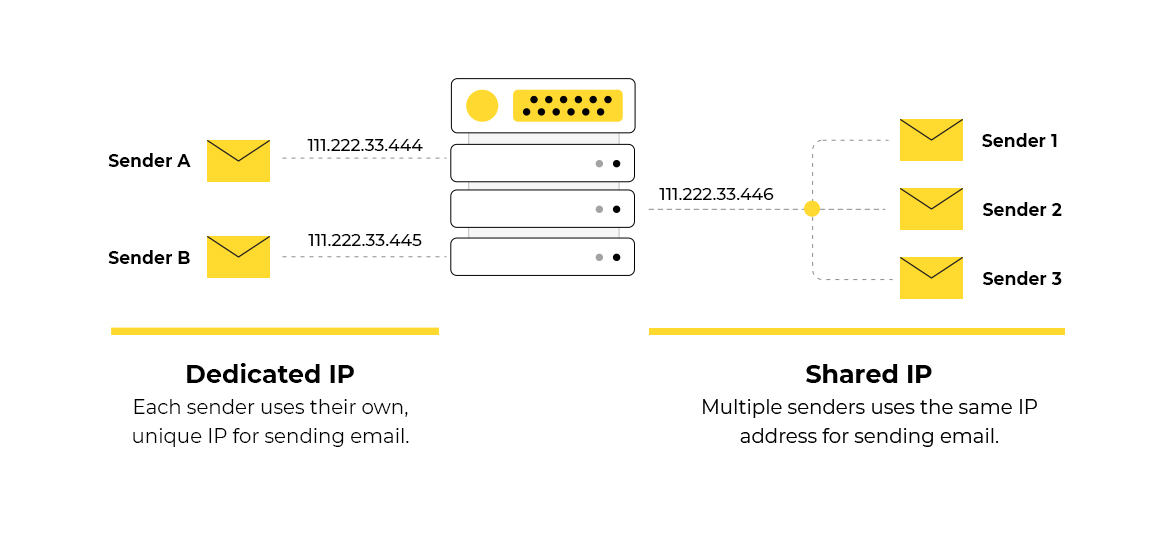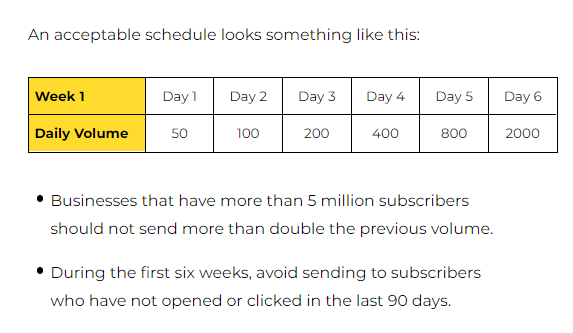Your IP reputation is directly proportional to the email deliverability. The better your IP reputation, the higher will be your email deliverability rate. Just like qualities such as proactiveness, ownership, and accountability define your professional reputation, inbox providers will judge your reputation by checking how you use your IP.
But first of all, what is an IP address?
An IP address can be compared to the digital and numeric version of a residential or office address. It is characterized by a string of numbers that help in recognizing the website location. Every website has a unique IP address.
It is used to send emails too. Whenever you send an email, inbox service providers look at the sender IP address to determine who you are.
Note: Generally, the website IP address does not change unless you migrate it to another network hardware, server, or data center.
There are two types of email IP addresses
1. Shared IP address
2. Dedicated IP address
What is a Shared IP Address?
As evident from the name, a shared IP address gets shared between you and several other senders. It facilitates deliverability by bringing together everyone’s IP reputation. And it is easy to set up. The ESP decides the grouping of the businesses. As a common practice, businesses of the same size are grouped together.
What is a Dedicated IP Address?
An IP address exclusively assigned to you is known as a dedicated IP address. Unlike shared IP addresses, you are solely responsible for the sender reputation when using dedicated IP.

Now, what do you think looking at the definitions? Which one will you prefer?
Dedicated IP, right?
After all, we all want to be the sole owners of our reputation and the emails we send.
However, it’s not so simple.
There are several parameters to be considered while you choose between a shared and dedicated IP.
Shared Versus Dedicated IP: Factors Governing the Choice
The factors that decide the right option for you are:-
1. The type of business and your budget
2. Types of email campaigns you send
3. Number of emails and their frequency
4. Whether you can wait before executing your email strategy
5. How proficient are you with email marketing
That being said, let’s see the pros and cons of each of these options. Based on that, you will be able to do away with the dilemma and make the correct choice.
First of all, we will discuss shared IP addresses.
Pros of using shared IP
The advantages of using shared IP are:-
1. It is a budget-friendly option
Shared IPs are lighter on the pocket when compared to dedicated ones. For startups or small businesses who are just taking the leap into the world of email marketing, shared IPs are better from a financial point of view.
2. It helps ensure a better sender reputation
Remember those group projects in school/college life where you divided the responsibilities to score well? That’s exactly the thing with shared IPs. All the senders make efforts to maintain a good sender reputation. So, the onus is not entirely on you. An occasional mistake will not have a major impact on the sender reputation as multiple senders are using the reputed shared IP.
3. Shared IP is suitable for new senders
New senders or novice email marketers should opt for a shared IP address as they can test the waters before buying a dedicated IP. It will let them leverage the reputation built by other email senders. Moreover, the email sending volume and cadence are not so important with shared IPs. They are good for companies that do not have a steady flow of email campaigns to send.
Cons of Shared IP Address
As it is a shared IP used by multiple email senders, there are several disadvantages like:
1. You risk losing your brand identity
With a shared IP address, your brand identity gets combined with that of several other brands. Therefore, it is difficult to establish your reputation at the brand or domain level.
2. Other senders can have a negative impact on your sender reputation
Using a shared IP address is like a double-edged sword — If other senders follow the deliverability best practices, well and good. But if they don’t, it will affect your sender reputation.
We shall, now, move on to the pros and cons of dedicated IP addresses.
Pros of dedicated IP address
Dedicated IP address is beneficial in the following ways:
1. Your sender reputation is in your hands
As you are the only one sending emails through the IP, you have complete control over the sender reputation. If you follow all the email sending best practices, you will have a favorable sender reputation (unlike the scenario in shared IP address). It’s as simple as that.
2. You can resolve IP issues more effectively
When you use a shared IP address, you cannot figure out what created the issue because of multiple senders. Contrarily, a dedicated IP address gives you the privilege of determining what caused the issue and fixing it. You are the only sender so you are well aware of the sending behavior and how to optimize it.
Cons of Dedicated IP addresses
The downsides of using dedicated IP addresses are:-
1. They are heavy on the pocket
As you are the only client paying for the IP, dedicated IP addresses are more expensive. You need more time and effort to manage and maintain them. So, it adds up to the overall cost.
2. One mistake can tarnish your reputation forever
You have to pay a big price for a single mistake while using dedicated IPs. They are not too merciful and immediately put you on a blacklist or land your emails in the spam folder. Consequently, it will ruin your sender reputation. Shared IPs are lenient in such cases and allow you to correct the issues.
3. You cannot start sending emails from the new dedicated IP
If you have recently invested in an IP, you will not be able to send emails immediately. You will have to warm up the IP by increasing the email volume slowly over time. Your new IP will have no reputation. That’s why you have to carry out IP warming to build your sender reputation.
How to carry out IP warming?

4. Dedicated IPs require you to send a large volume of emails
Shared IPs have a number of users. So, volume of emails is not an issue. However, when you are using dedicated IP, you have to be consistent in your approach and send a considerable number of emails.
As a best practice, dedicated IPs work well if you have to send around 100k emails every month (according to Litmus). Also, as mentioned in the previous point, you will not be able to increase the volume of emails suddenly. A sudden rise in the number of emails will paint you guilty in the eyes of the inbox providers and spam filters.
Weighing the Pros and Cons
After having looked at the pros and cons of each option, let’s see which are the best use cases for them.
1. Dedicated IPs are best if:
- You have too many emails to send in a month.
- You have a team of experts who can execute your email marketing strategy.
- You can afford the dedicated IP.
- You know the technicalities involved in the process — like IP warming.
- You have had a bad experience while using a shared IP address.
2. Shared IPs are recommended when:
- You have fewer emails to send every month.
- Your shared IP partners have a favorable reputation and you can use it while embarking on your email marketing journey.
- You are running low on finances.
- You are not too technically sound and unfamiliar with things like IP warming.
Tools You Can Use For Shared and Dedicated IPs
- Postmark provides shared as well as dedicated IPs according to your needs.
They meticulously evaluate the new senders so that you have a great experience while using shared IPs. They ensure optimum deliverability even with shared IP addresses.
For dedicated IPs, they make sure that you are sending more than 300k emails per month. They help with dedicated IPs only if you fit in this criteria and have other complex requirements.
- SendX is an email marketing software offering a 14-day free trial.
You can go for dedicated IP from SendX if you are sending over 200k emails in a month. You can take their free trial and see how it works for your email deliverability. Once you are convinced, you can make the purchase decision.
Wrapping Up
Many businesses struggle with deciding whether to go for a static IP address or dedicated one. Through this article, we have tried to clear the dilemma surrounding it and help you make the right decision.
We would love to know your experience with using shared or dedicated IP addresses. Let us know in the comments below.




Disha Bhatt (Dave)
Latest posts by Disha Bhatt (Dave) (see all)
How to minimize Landing Page Bounce Rate and Maximize Conversions
Email Uplers’ CRM Email Marketing Survey: Key Findings To Improve Your Business Foothold